 W
WThe bokikokiko, Kiritimati reed warbler or Christmas Island warbler is a species of warbler in the family Acrocephalidae. It is found only on Kiritimati and Washington Island (Kiribati).
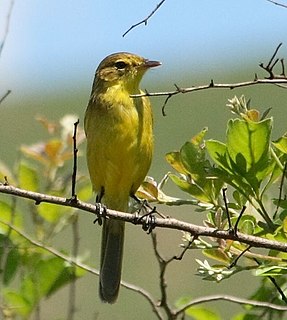 W
WChloropeta was a genus of Acrocephalidae warblers; formerly, they were placed in the paraphyletic "Old World warblers". Now the papyrus yellow warbler is placed in its monotypic genus Calamonastides, with the others placed in the genus Iduna.
 W
WHippolais is a genus of tree warbler in the family Acrocephalidae. It is sometimes associated with the genus Iduna. The genus name Hippolais is from Ancient Greek hupolais, as misspelt by Linnaeus. It referred to a small bird mentioned by Aristotle and others and may be onomatopoeic or derived from hupo,"under", and laas, "stone".
 W
WThe Manchurian reed warbler, also known as the Manchurian reed-warbler, is a species of marsh-warbler. It was formerly included in the "Old World warbler" assemblage, and was usually treated as a subspecies of the paddyfield warbler. It is found in Cambodia, China, Hong Kong, South Korea, Laos, Russia, Thailand, Vietnam, Malaysia and possibly Myanmar. Its natural habitat is swamps. It is threatened by habitat loss.
 W
WThe millerbird is a species of Old World warbler in the family Acrocephalidae. It has two subspecies, A. f. kingi and A f. familiaris. The latter, the Laysan millerbird, became extinct sometime between 1916 and 1923. The former, the critically endangered Nihoa millerbird, remains the only race left, inhabiting the small island Nihoa in Hawaiʻi, though it has since been reintroduced to Laysan. It is the only Old World warbler to have colonised Hawaiʻi, although there is no fossil evidence that the species ever had a distribution beyond these two islands.
 W
WNesillas is a genus of Old World warbler in the family Acrocephalidae. Established by Harry Church Oberholser in 1899, it contains the following species:Grand Comoro brush warbler Subdesert brush warbler Anjouan brush warbler Moheli brush warbler Malagasy brush warbler Aldabra brush warbler (extinct)
 W
WThe nightingale reed warbler, or Guam reed-warbler, was a songbird endemic to Guam. It has not been seen since the 1960.
 W
WThe Rodrigues warbler is a species of Old World warbler in the family Acrocephalidae.
 W
WThe speckled reed warbler or streaked reed warbler is an Old World warbler in the family Acrocephalidae. The species was first described by Robert Swinhoe in 1863.
 W
WThe blunt-winged warbler is a marsh-warbler. The species was first described by Robert Swinhoe in 1870. It was formerly included in the "Old World warbler" assemblage.
 W
WThe booted warbler is an Old World warbler in the tree warbler group. It was formerly considered to be conspecific with Sykes's warbler, but the two are now usually both afforded species status. Booted warbler itself breeds from central Russia to western China, and migrates to winter in the Indian subcontinent as far south as Sri Lanka. Booted warbler has expanded its breeding range westward in recent decades and nests now as far west and north as Finland. It is a small passerine bird, found in open country with bushes and other tall vegetation. 3-4 eggs are laid in a nest in a bush or vegetation. Like most warblers they are insectivorous.
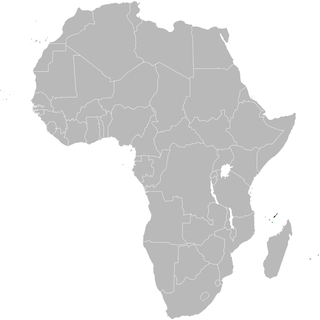 W
WThe Anjouan brush warbler is a species of Old World warbler in the family Acrocephalidae. It is found in the Comoros and Mayotte.
 W
WThe Grand Comoro brush warbler is a species of Old World warbler in the family Acrocephalidae. It is found in Comoros and Mayotte. Its natural habitat is subtropical or tropical moist montane forests.
 W
WThe Malagasy brush warbler, also known as the Madagascar brush-warbler, is a species of Old World warbler in the family Acrocephalidae. It is found in Comoros and Madagascar. Its natural habitats are subtropical or tropical dry forests, subtropical or tropical moist lowland forests, and subtropical or tropical moist shrubland.
 W
WThe Moheli brush warbler is a species of Old World warbler in the family Acrocephalidae. It is found only in Comoros. Its natural habitat is subtropical or tropical moist montane forests.
 W
WThe subdesert brush warbler, also known as Lantz's brush-warbler, is a species of Old World warbler in the family Acrocephalidae. It is found only in Madagascar.
 W
WThe mountain yellow warbler or mountain flycatcher-warbler is a species of Acrocephalidae warbler; formerly, these were placed in the paraphyletic "Old World warblers".
 W
WThe Basra reed warbler is a "warbler" of the genus Acrocephalus. It is an endemic breeder in East and southern Iraq, Kuwait, and Israel in extensive beds of papyrus and reeds. It is easily mistaken for the great reed warbler but is a bit smaller, has whiter under parts and has a narrower, longer and more pointed bill. It winters in East Africa. It is a very rare vagrant in Europe. The call is a gruff 'chaar', deeper than a reed warbler's.
 W
WThe black-browed reed warbler is a marsh-warbler. It was formerly included in the "Old World warbler" assemblage. The species was first described by Robert Swinhoe in 1860.
 W
WThe Carolinian reed warbler or Caroline Islands reed warbler is a species of Old World warbler in the family Acrocephalidae. It is found only on the Caroline Islands in Micronesia.
 W
WThe clamorous reed warbler is an Old World warbler in the genus Acrocephalus. It breeds from Egypt eastwards through Pakistan, Afghanistan and northernmost India to south China, southeast Asia and south to Australia. A. s. meridionalis is an endemic race in Sri Lanka.
 W
WThe Cook reed warbler or Cook Islands reed warbler, is a species of Old World warbler in the family Acrocephalidae. It is native to the southeastern Cook Islands. Its natural habitats are subtropical or tropical dry forests, swamps, and rural gardens. It is threatened by habitat loss.
 W
WGarrett's reed warbler, sometimes called Society Islands reed warbler or Forster's reed-warbler was a songbird in the genus Acrocephalus. Formerly placed in the "Old World warbler" assemblage (Sylviidae), it is now in the newly recognized marsh warbler family Acrocephalidae. It was endemic to Raiatea and Huahine in the Society Islands.
 W
WThe Henderson reed warbler, also known as the Henderson reed-warbler, is a species of Old World warbler in the family Acrocephalidae. It is found only on Henderson Island, part of the Pitcairn Islands. Its natural habitat is subtropical or tropical dry forests. It is threatened by habitat loss.
 W
WMoorea reed warbler is a species of songbird in the genus Acrocephalus. Formerly placed in the "Old World warbler" assemblage (Sylviidae), it is now in the newly recognized marsh warbler family Acrocephalidae. It was once considered a subspecies of the Tahiti reed warbler.
 W
WThe northern Marquesan reed warbler is a species of Old World warbler in the family Acrocephalidae. It was formerly considered conspecific with the southern Marquesan reed warbler, and together known as the Marquesan reed warbler.
 W
WThe Pitcairn reed warbler is a songbird in the genus Acrocephalus. Formerly placed in the "Old World warbler" assemblage (Sylviidae), it is now in the newly recognized marsh-warbler family Acrocephalidae.
 W
WThe Rimatara reed warbler is a species of Old World warbler in the family Acrocephalidae. It is found only in Rimatara in French Polynesia. Its natural habitats are subtropical or tropical dry forests and swamps. Due to its limited geographic distribution, this bird is classified as critically endangered on The International Union for Conservation of Nature (IUCN) Red List of Threatened Species.
 W
WThe Saipan reed warbler is a critically endangered songbird of the Northern Mariana Islands. It is considered a subspecies of the nightingale reed warbler by some taxonomists. It occurs on two islands : Saipan and Alamagan. An estimated population of 2700 specimen was reported in 2009 on Saipan, and on Alamagan 950 specimen were reported in 2010.
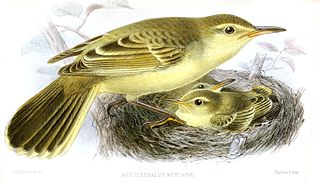 W
WThe southern Marquesan reed warbler is a species of Old World warbler in the family Acrocephalidae.
 W
WThe Tahiti reed warbler is a songbird in the genus Acrocephalus. It used to be placed in the "Old World warbler" assemblage (Sylviidae), but is now in the newly recognized marsh warbler family Acrocephalidae. It is endemic to the island of Tahiti.
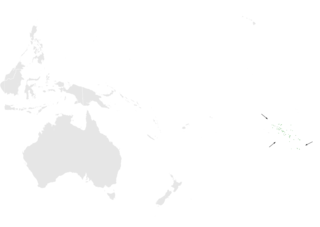 W
WThe Tuamotu reed warbler is a species of Old World warbler in the family Acrocephalidae. It is found only in French Polynesia.
 W
WThe greater swamp warbler is a species of Old World warbler in the family Acrocephalidae. It is found in Angola, Botswana, Burundi, Cameroon, Central African Republic, Chad, Republic of the Congo, Democratic Republic of the Congo, Equatorial Guinea, Gabon, Ghana, Kenya, Mali, Mauritania, Namibia, Nigeria, Rwanda, Senegal, South Sudan, Tanzania, Togo, Uganda, Zambia, and Zimbabwe. Its natural habitat is swamps.
 W
WThe Madagascar swamp warbler is a species of Old World warbler in the family Acrocephalidae. It is found only in Madagascar. Its natural habitat is swamps.
 W
WSykes's warbler is an Old World warbler in the tree warbler family. It was formerly considered a subspecies of the booted warbler, but is now considered a full species. Its breeding range is from northeast Arabia to Turkestan, West China and Afghanistan. Like the booted warbler, many populations of the species migrate in winter to the Indian subcontinent as far south as Sri Lanka.
 W
WThe thick-billed warbler breeds in the temperate east Palearctic. South Siberia to West Mongolia.It is migratory, wintering in tropical South Asia and South-east Asia. It is a very rare vagrant to western Europe.
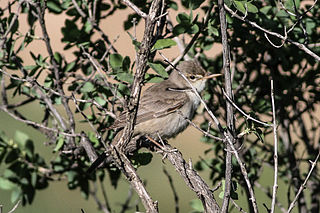 W
WUpcher's warbler is an Old World warbler in the tree warbler genus Hippolais. It breeds in an area from Turkey south and east to Pakistan. It is migratory, wintering in eastern Africa, from Eritrea and Somalia south to Tanzania.
 W
WThe papyrus yellow warbler, papyrus flycatcher-warbler or thin-billed flycatcher-warbler is a species of tree warbler; formerly, these were placed in the paraphyletic "Old World warblers". It is monotypic in its genus. It is found in Burundi, Democratic Republic of the Congo, Kenya, Rwanda, Tanzania, Uganda, and Zambia. Its natural habitat is swamps. It is threatened by habitat loss.